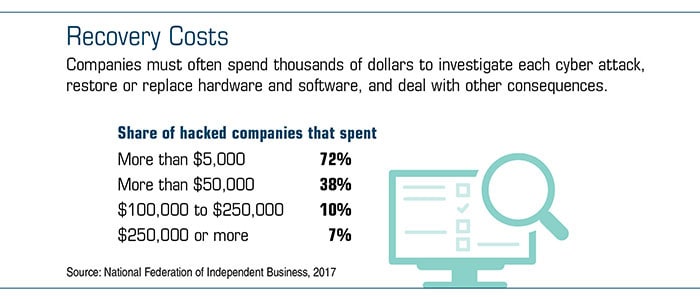
Hackers are continuing to target small businesses at an alarming rate. In one 2017 survey, 53% of executives said their businesses had experienced a cyber attack in the previous year.1
When a data breach occurs, outsiders gain access to the personally identifiable information of customers or other individuals, opening the door for identity theft and other financial crimes. A company can be held legally responsible when its customers’ personally identifiable information is disclosed. Moreover, the time and expense involved in recovering from any type of cyber attack could be insurmountable.
Current Trends
A spear-phishing attack often involves emails sent to employees. Clicking on a malicious link provides access to the company’s network, allowing the installation of malware designed to steal or hijack critical data.
With a watering hole attack, the attacker guesses or observes which websites a targeted group often uses and infects them with malware. Eventually, some member of the targeted group gets infected.
Ransomware is a menacing virus that locks businesses out of their computer files and demands payment of a ransom in exchange for the return of company systems and data. There were 463,000 cases of ransomware detected in 2016, a 36% rise from 2015. And the average ransom demand rose to $1,077.2
Fortify Your Defenses
Given the risks, it might be safer to assume that your business could be targeted and prepare accordingly. Here are some cybersecurity tips for small businesses offered by the Federal Trade Commission.
- Install and update antivirus and antispyware software on every computer, and maintain firewalls between the internal network and the Internet.
- If you have a Wi-Fi network, set it up so the network name is hidden and a secure password is required for access. Require passwords to be changed on a regular basis.
- Train employees in security practices, and specifically not to open emails from unknown senders. Set up a separate account for each user and provide access only to the data needed for users to perform their jobs
- Lock up computers, laptops, and tablets to prevent them from falling into the wrong hands.
- Consider purchasing Internet liability insurance, which may offer some protection (up to policy limits) from the financial risks associated with computer hacking, spam, viruses, and other online perils.

